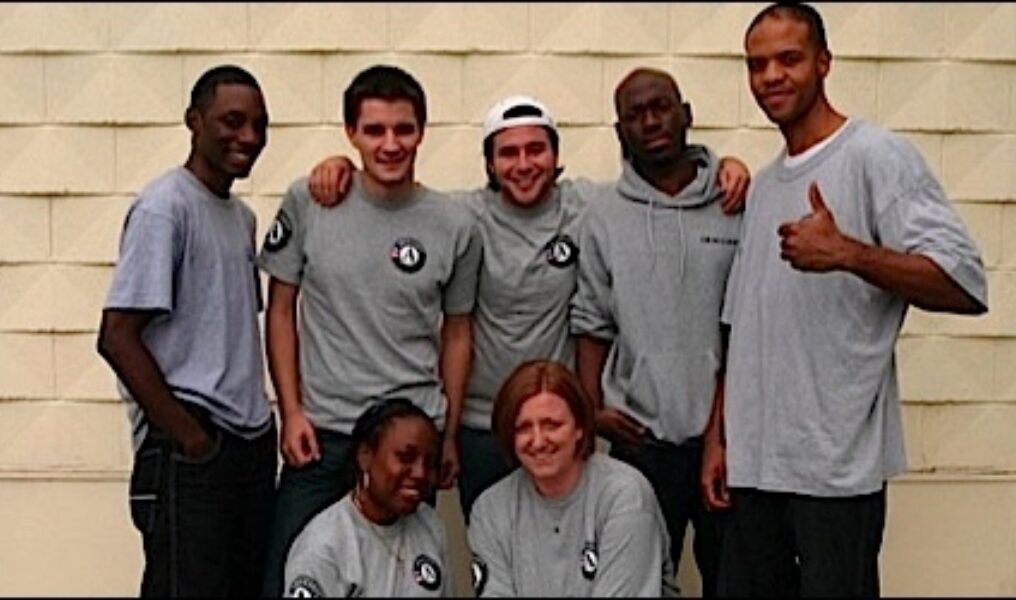by Jessica Carreras

Maxwell Cameron, second from left.
Maxwell Cameron is a 22-year-old activist working with the National AIDS Fund's Detroit AmeriCorps team. A resident of Royal Oak, he hopes to make an impact on HIV/AIDS.
1) How did you get involved with AmeriCorps?
The underlying reason I became involved was my passion for working in the HIV/AIDS field.
I first worked on HIV/AIDS issues when I was a student at the College of William and Mary. I was a team leader for a campus group that did HIV/AIDS prevention education and HIV testing in Tanzania. When I was selected to join the 2009/10 National AIDS Fund AmeriCorps/Caring Counts team here in Detroit, I jumped at the chance to come back to the Detroit area and work in this field. AmeriCorps has provided me with the opportunity to explore my interests and give back to my community.
2) What does your team do?
Detroit is one of seven U.S. cities that host a National AIDS Fund AmeriCorps/Caring Counts program. For the past 13 years, the Detroit team has been overseen by Terry Ryan, now based out of the Michigan AIDS Coalition in Ferndale. MAC also acts as our program's operating site.
This year, our team consists of six members who have dedicated 11 months to serve with the program. Each member is placed at a different agency in the metro Detroit/Ann Arbor area, where we work four days a week. On Thursdays, we come together as a team and undertake one-day service projects. Some of the projects we have done so far this year include volunteering at a soup kitchen, doing outreach education and helping with HIV testing and counseling events.
It's really exciting to be a part of this program simply because of its history here. Since Detroit became a host city in 1997, members have contributed over 165,000 hours of service – an in-kind contribution of approximately 3.3 million dollars to the local HIV/AIDS field. I think the current economic climate has made our work that much more valuable to the people we serve.
3) What do you hope to accomplish through this work?
As much as AmeriCorps is about doing, for me it has been the learning aspect of service that has meant the most. The access to resources and individuals who have dedicated their life to the HIV/AIDS field has provided me with great opportunities to learn and grow both professionally and personally. My objective has been to translate what I've learned from my coworkers and team mates into producing tangible results that will help those living with HIV/AIDS here in Detroit.
4) How did your team honor World AIDS Day? What else is coming up in the near future?
World AIDS Day was a busy time for the team. We are a member of the Detroit Red Ribbon Collaborative, which hosted a health fair at Le Sed Youth Community Centre on Dec. 1. The collaborative is a partnership between MAC, Detroit Latin@z, Al Gamea, Young Brothers United and our team. We saw a need to bring together the African American, Middle Eastern American and Latino LGBT communities in recognition of this very important day. The event included HIV testing, a presentation of the AIDS quilt and a candlelight vigil.
On Dec. 5, the DRRC also hosted a fantastic 'Red Party' fundraiser at Menjos.
We also participated in a HIV testing event at the Detroit Department of Health and Wellness, and we ran HIV testing on the campus of the University of Detroit.
Currently we are gearing up for our Long Term Project. Every year each AmeriCorps team undertakes a project, known as the Long Term Project. On Saturday, May 22, we are holding a fashion show fundraiser at the Northwest Activities Centre in Detroit.
5) What is the most rewarding thing about the work you do?
By far the most rewarding aspect of this experience has been the array of issues that I work on both as a member of my team and at my placement at Health Emergency Lifeline Programs. One of the things you realize when you get involved in AmeriCorps is that there are so many great opportunities to make an impact in this field. Whether it's planning team service days, linking clients to care, helping set up education programs, or planning a Long Term Project, you begin to realize that what you are doing on a daily basis is making a lasting impact, not only on the HIV/AIDS field, but on the lives of the individuals we work with.
Interested in joining AmeriCorps? Visit http://www.americorps.gov to learn more.










